27 Sep 2016 | Bahrain, Campaigns, Campaigns -- Featured
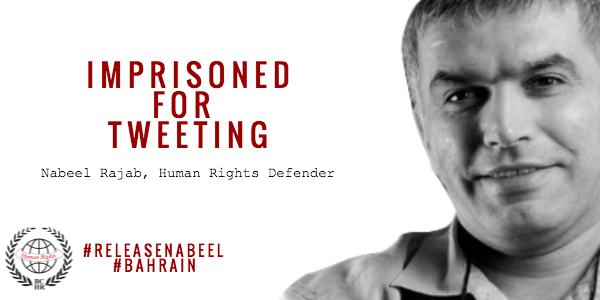
On Sunday 25 September Nabeel Rajab was transferred from the West Riffa Police Station to solitary confinement in the East Riffa Police Station ahead of his sentencing next week.
“It’s been over a hundred days since Nabeel was arrested and charged and am very worried about his well-being. He has been treated harshly and sent back to a place where he suffered complete isolation in facilities not fit for purpose,” Sumaya Rajab, Nabeel’s wife, said.
The last time the 2012 Index on Censorship award-winning Rajab was held in East Riffa, he required urgent medical care after two weeks of isolation in deplorable conditions. The president of the Bahrain Center for Human Rights faces up to 15 years in prison on 6 October on three charges related to his posts on social media.
Rajab is currently being held in a filthy cell. He has not been given a reason for his transfer, and when he tried to ask a police officer, he was screamed at and insulted. When his family delivered clothes and toiletries to the station, officers dirtied them with water and soil before giving them to Rajab. The police officers refused the family’s attempt to give Rajab a radio.
Rajab’s continued detention in police stations is extraordinary. Male detainees are normally only held in police custody until formal charges are brought against them; they are then transferred to the Dry Dock Detention Centre for pre-trial detention. Police stations do not have the facilities for long-term detention. Rajab, who was charged a day after his arrest, has requested multiple times for his rightful transfer to Dry Dock, as has his lawyer. These requests have all been denied.
Rajab has been held in pre-trial detention since his 13 June 2016 arrest. He was initially held in East Riffa. After 15 days in solitary confinement – which the UN’s top expert judges may amount to torture – he required urgent medical attention. Rajab was rushed to the Bahrain Defence Force hospital with breathing difficulties, an irregular heartbeat and a weak immune system.
Sayed Ahmed Alwadaei, Director of Advocacy, Bahrain Institute for Rights and Democracy: “Nabeel Rajab’s prosecution is part of the Bahraini monarchy’s expansion of authoritarianism and his imprisonment emboldens dictatorship. The US and UK need to step up and criticise this ally, which they have supported with arms and assistance despite the crushing of peaceful critics.”
After being released by the hospital, and police transferred him to the West Riffa police station. His treatment improved at that facility: Rajab was no longer kept strictly in solitude and allowed more regular phone calls.
His family are concerned that his health will decline again and think that this latest transfer suggests a harsh prison sentence will be handed down in October.
Rajab faces multiple charges of “insulting a statutory body”, “insulting a neighboring country”, and “disseminating false rumors in time of war”. These are in relation to remarks he tweeted and retweeted on Twitter in 2015 about torture at Bahrain’s Jau prison and the humanitarian crisis caused by the Saudi-led war in Yemen.
Since 2011, Rajab has faced ongoing judicial harassment and prison sentences for his vocal activism. He was placed on a travel ban in 2014 and has been unable to leave the country.
More about Nabeel Rajab:
Who is Nabeel Rajab?
Prince Charles to visit Bahrain: Here are some things he should consider
Bahrain: Prominent rights activist charged for New York Times letter
Index award winners and judges call for release of Bahraini campaigner
27 Sep 2016 | Awards, Fellowship, Fellowship 2016, Middle East and North Africa, News and features, Syria
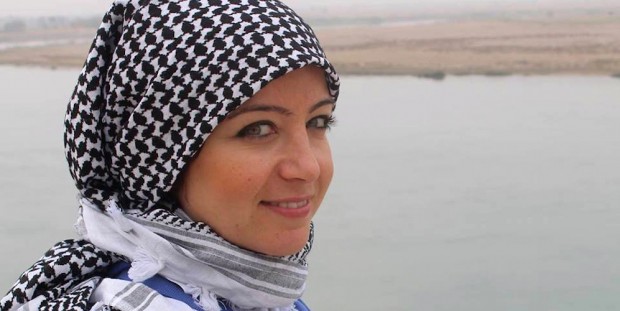
This week, UN officials described the Syrian regime’s offensive against the besieged city of Aleppo as “barbaric”. Following the collapse of a short-lived ceasefire, Syrian forces again began bombing Aleppo on Sunday, a continuation of the “unrelenting onslaught of cruelty”.
Aleppo is the former home of Zaina Erhaim, activist, journalist and winner of the 2016 Index on Censorship award for journalism for her work training citizen journalists to report on the conflict within the city.
|
Zaina Erhaim is the 2016 Index on Censorship Freedom of Expression Journalism Award-winner and fellow. A Syrian native who was studying journalism in London when war broke out in Syria in 2013, Erhaim decided to return permanently to report and train citizen journalists in the war-ravaged country. Read more about Erhaim’s work.
|
|
The battle for Aleppo has been raging since 2012, the same year Erhaim’s husband, the activist Mahmoud Rashwani, was arrested and tortured by the Syrian regime for participating in peaceful protests.
Writing on 11 August 2016 Erhaim – who now lives in Turkey with the couple’s seven-month-old daughter – said: “Among the estimated 300,000 to 400,000 people living on Aleppo’s eastside, Mahmoud hadn’t had any vegetables or fruit for the past month.”
She added that shortages of food – from fresh produce and canned food, to eggs, flour and baby milk – along with a lack of fuel have have left the people of Aleppo increasingly vulnerable.
Speaking to Index on Censorship, Erhaim said she was “incredibly proud” about her husband’s “brave” work searching for survivors among the rubble of bomb out buildings in Aleppo alongside other volunteers.
On 15 August, it was Rashwani’s neighbour’s home which was left in ruins. The neighbour – a journalist – along with his pregnant wife, were killed, while Rashwani escaped with a knee injury, Erhaim told Index.
Rashwani’s home, which he shared with Erhaim before she left the city, was also damaged.
Rashwani travels between Syria and Turkey to be with his family, but the journey has become increasingly difficult as the war rages on, Erhaim said.
Erhaim herself faced difficulty with a border this week. Travelling from Istanbul on 22 September to attend an event organised by Index on Censorship, border officials at Heathrow airport held the activist and her child for an hour before confiscating her passport after it was reported by the Syrian authorities as stolen. She was told that her passport would have to be returned to the Syrian government.
Erhaim was able to enter the UK on an old passport. However, this passport is now full, making future travel plans and visa applications potentially impossible.
Now back in Turkey, she will continue to work on projects with the Institute for War and Peace Reporting, she told Index. She is in the process of selecting five activists for a filmmaking project and has just completed hostile environments, first aid and digital security training with a number of journalists – essential skills for anyone reporting from Syria.
Erhaim will also continue to work on the Women’s Blog on The Damascus Bureau, which has just received a book deal from a French publisher. “The first edition will be in French and will be followed by editions in Arabic and English,” she told Index.
Speaking ahead of the Index event on women who report from war zones, Erhaim told Index: “The voices of women are very important because they are telling what is happening behind the frontline. While the major concern for most of the men in these situations is the actual conflict, women also think about education, health systems, clinics, social traditions, the changes in wedding styles – they are reporting on life.”
Nominations are now open for 2017 Index on Censorship Freedom of Expression Awards and will remain open until 11 October. You can make yours here.
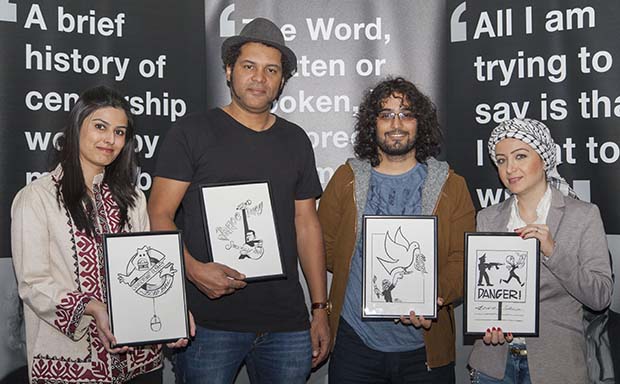
Winners of the 2016 Freedom of Expression Awards: from left, Farieha Aziz of Bolo Bhi (campaigning), Serge Bambara — aka “Smockey” (Music in Exile), Murad Subay (arts), Zaina Erhaim (journalism). GreatFire (digital activism), not pictured, is an anonymous collective. Photo: Sean Gallagher for Index on Censorship
More about Zaina Erhaim
Index condemns UK’s seizure of award winner’s passport
Women on the front line: Zaina Erhaim and Kate Adie on the challenges of war reporting
Zaina Erhaim: “I want to give this award to the Syrians who are being terrorised”
#IndexAwards2016: Zaina Erhaim trains Syrian women to report on the war
26 Sep 2016 | Europe and Central Asia, Events, Norway
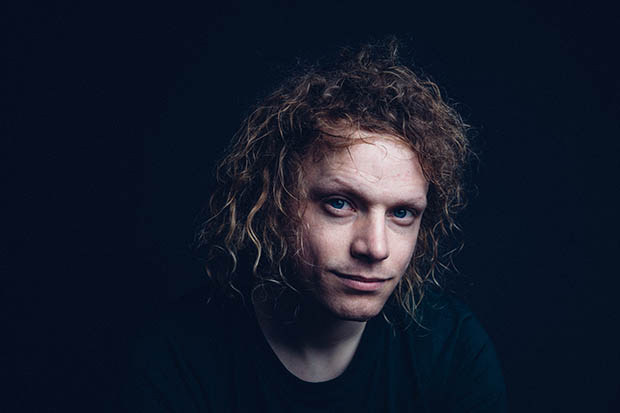
To mark the release of Norwegian musician Moddi’s new album, Unsongs, Index on Censorship is proud to announce a special series of appearances by currently banned voices from around the world.
Moddi will hand over the stage at three of the biggest gigs on his current European tour to unleash the power of free expression, replacing the support band with the genuinely banned.
In Amsterdam on 1 October, Maryam Al-Khawaja will share her and her family’s story of imprisonment and exile in the struggle for democracy in Bahrain. In London on 3 October, Vanessa Berhe will speak about life in the prison state of Eritrea and her campaign One Day Seyoum fighting to free her journalist uncle Seyoum Tsehaye who has been in jail for 15 years. In Berlin on 6 October, Raqqa Is Being Slaughtered Silently will tell how the Syrian civil war has destroyed the free expression of a generation. Co-founder Abdalaziz Alhamza will share the story of how and why he co-founded it inside IS-controlled territory.
“Unsongs is a remarkable collection of songs that have, at one stage, been banned, censored or silenced. The attempts to suppress them were as mild as an airplay ban and as brutal as murder. With great sensitivity and imagination, Norwegian singer-songwriter Moddi has given them new life and created a moving and eye-opening album. Unsongs simultaneously celebrates the censored and exposes the censors.” – Dorian Lynskey
Amsterdam, Jeruzalemkerk, Saturday 1 October, 8:30pm
The Banned: Maryam Al-Khawaja (Bahrain)
Tickets
London, St. Giles-In-The-Fields, Monday 3 October, 8pm
The Banned: Vanessa Berhe (Eritrea)
Tickets
Berlin, Silent Green, Thursday 6th October, 8pm
The Banned: Raqqa Is Being Slaughtered Silently (Syria)
Tickets
The series will be launched with a live Twitter chat with Moddi and Index on Censorship on Thursday 29 September at 3pm. Ask Moddi a question using the hashtag #WithTheBanned.
26 Sep 2016 | Europe and Central Asia, Event Reports, Middle East and North Africa, mobile, News and features, Syria, United Kingdom
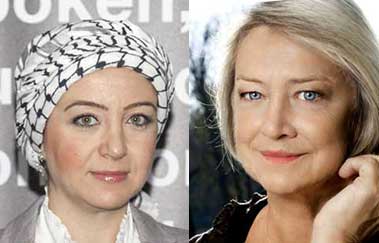
Journalists Zaina Erhaim and Kate Adie spoke at Write on Kew. (Photos: Sean Gallagher, Ken Lennox)
On 24 September Index on Censorship’s CEO, Jodie Ginsberg, gathered with former BBC chief news correspondent Kate Adie and 2016 Index award-winning journalist Zaina Erhaim in Kew Gardens to discuss journalism in war zones and what it’s like to be a woman reporting from crisis points.
Kate Adie has been a prominent figure in journalism since the 1980s, covering, among other major events, the 1980 London Iranian Embassy siege, the Tiananmen Square protests, the Rwandan Genocide and the war in Sierra Leone. After 14 years as BBC’s chief news correspondent, Adie now works as a freelance journalist, author and presents From Our Own Correspondent on BBC Radio 4.
Zaina Erhaim is a Syrian journalist known for her activism in Aleppo and teaching journalism skills to the men and women in Syria. Erhaim currently works as the Syria project coordinator with the Institute for War and Peace Reporting.
Ginsberg asked Adie and Erhaim what influenced them to become journalists. Erhaim said her mother was the only family members that supported her career choice. The rest of her relatives told her: “Nobody wants to marry a journalist.”
Growing up in a conservative society where the regime censored everything, Erhaim was inspired to study journalism in the UK. After the escalation of the war in Syria, Erhaim knew that she could never abandon her home in Aleppo. She returned to the ravaged city to train journalists, particularly women, to spread the untold stories of those hurt by the war.
Adie discussed how her generation was affected by the aftermath of World War II, with women being incorporated into the workforce during warfare then pushed “back to the kitchen” after the war ended. She admits that growing up she had no expectations for her career, but after visiting East Berlin during the Cold War, she discovered that the rest of the world was not as comfortable as the one she grew up in, fueling her desire to become a journalist.
Exploring the challenges woman face in journalism, Adie said that there were obvious concerns in countries that view women as secondary beings. The fear of being raped or assaulted is always present, she said, adding that there are judicial systems in place that could see her imprison for being a female out alone in public.
Adie emphasised that she does not like to be portrayed as a “woman journalist” but instead a “journalist who happens to be a woman”.
As a woman, Erhaim was not allowed to travel to the “front line” of the Syrian war. However, this allowed her to focus on the unreported stories and train Syrian women and men in journalism. She experienced some difficulty when training men, saying that many refused to look her in the eye because they thought it shameful to be taught by a woman. This was not something she cared about, considering her focus was to get the untold stories to the public.
An audience member later asked whether there are real front lines in warfare anymore, to which both Erhaim and Adie answered no. Adie stated that contemporary front lines are “complete fantasy,” stressing that war is no longer something that stays on the battlefield, but something that divides a village and follows you home.
Parting with advice for aspiring journalists, Erhaim simply stated: “Don’t go to war zones.” Adie reminded the audience that journalism is tough and often doesn’t pay well, but telling people about the world and bringing a story back will be the most rewarding feeling a journalist can accomplish.
More about Zaina Erhaim
Confiscation of Syrian journalist’s passport is appalling
Zaina Erhaim: “I want to give this award to the Syrians who are being terrorised”
#IndexAwards2016: Zaina Erhaim trains Syrian women to report on the war
24 Sept: Women on the front line at Write on Kew





